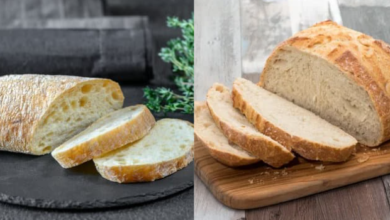White Bread Vs Multigrain Bread: Pros And Cons Of Each Food
What To Know
- As a result, white bread is primarily a source of empty calories and lacks the nutritional value of its multigrain counterpart.
- When it comes to taste and texture, the choice between white bread and multigrain bread is a matter of personal preference.
- Based on the nutritional evidence, multigrain bread emerges as the clear winner in the white bread vs multigrain bread debate.
When it comes to bread, the eternal debate rages on: white bread vs multigrain bread. Both options have their loyal proponents, each claiming superiority in taste, texture, and nutritional value. So, which bread reigns supreme? Let’s delve into the nutritional depths of these two bread titans and determine the healthier choice.
Nutritional Breakdown: Unmasking the Hidden Truths
White Bread: A Refined Revelation
White bread, the epitome of processed carbs, undergoes a refining process that strips it of its bran and germ, leaving behind a soft, white interior. This refining process also removes most of the fiber, minerals, and vitamins found in whole grains. As a result, white bread is primarily a source of empty calories and lacks the nutritional value of its multigrain counterpart.
Multigrain Bread: A Whole-Grain Wonder
In contrast, multigrain bread is a nutritional powerhouse crafted from a blend of whole grains, including wheat, oats, barley, and rye. Unlike white bread, multigrain bread retains its bran and germ, which are brimming with fiber, minerals, and vitamins. This whole-grain goodness makes multigrain bread a more nutrient-dense option.
Health Benefits: Separating Fact from Fiction
White Bread: Questionable Nutritional Value
While white bread provides some energy in the form of carbohydrates, its nutritional value is meager. It lacks the fiber, vitamins, and minerals essential for a healthy diet. Additionally, its high glycemic index can cause blood sugar spikes, leading to energy crashes and increased hunger.
Multigrain Bread: A Nutritional Champion
Multigrain bread, on the other hand, is a nutritional champion. Its high fiber content promotes satiety, helping you feel fuller for longer. The fiber also aids digestion and can reduce the risk of chronic diseases such as heart disease and type 2 diabetes. Moreover, multigrain bread is a rich source of vitamins, minerals, and antioxidants, which contribute to overall health and well-being.
Taste and Texture: A Matter of Personal Preference
When it comes to taste and texture, the choice between white bread and multigrain bread is a matter of personal preference. White bread is known for its soft, fluffy texture and mild flavor, making it a popular choice for sandwiches and toast. Multigrain bread, on the other hand, has a denser texture and a more complex, nutty flavor. Its hearty nature pairs well with savory fillings and soups.
Suitability for Specific Diets
White Bread: Limited Dietary Appeal
White bread is not suitable for individuals with gluten intolerance or sensitivity, as it contains gluten, a protein found in wheat. Additionally, its high glycemic index makes it a less desirable option for people with diabetes or prediabetes.
Multigrain Bread: A Versatile Dietary Option
Multigrain bread is a more versatile dietary option. It is suitable for individuals with gluten intolerance or sensitivity if made with gluten-free grains. Moreover, its lower glycemic index makes it a better choice for people with diabetes or prediabetes.
Environmental Impact: Considering the Bigger Picture
The environmental impact of bread production is an often-overlooked factor. White bread, due to its refined nature, requires more energy and resources to produce than multigrain bread. Multigrain bread, on the other hand, is made from whole grains that require less processing and are more environmentally sustainable.
The Verdict: Unlocking the Nutritional Crown
Based on the nutritional evidence, multigrain bread emerges as the clear winner in the white bread vs multigrain bread debate. Its superior fiber content, abundance of vitamins and minerals, and lower glycemic index make it the healthier choice. While white bread may have a softer texture and milder flavor, its nutritional deficiencies outweigh its sensory appeal.
Beyond the Binary: Exploring Other Bread Options
Beyond the white bread vs multigrain bread dichotomy, a wide range of other bread options exists. Here are a few alternatives to consider:
- Whole Wheat Bread: Made entirely from whole wheat flour, providing a good balance of fiber, vitamins, and minerals.
- Sourdough Bread: A fermented bread with a tangy flavor, known for its digestibility and potential prebiotic benefits.
- Sprouted Grain Bread: Made from grains that have been allowed to sprout, resulting in increased nutrient content and a slightly sweeter flavor.
- Gluten-Free Bread: Suitable for individuals with gluten intolerance or sensitivity, made from alternative flours such as almond flour or coconut flour.
Quick Answers to Your FAQs
Q: Is white bread really that bad for me?
A: While white bread is not inherently harmful, it lacks the nutritional value of multigrain bread and can contribute to weight gain and other health issues if consumed in excess.
Q: Can I eat multigrain bread every day?
A: Yes, multigrain bread is a healthy and nutritious option that can be enjoyed as part of a balanced diet. However, moderation is key, as consuming too much bread can lead to weight gain.
Q: Is sourdough bread healthier than multigrain bread?
A: Sourdough bread and multigrain bread are both nutritious options with their own unique benefits. Sourdough bread may have a lower glycemic index and be easier to digest, while multigrain bread provides a wider range of vitamins and minerals.
